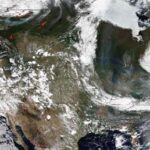Last week, the Grand Challenges team, led by ESSIC Director Ellen Williams, met with Matt Fleming, Executive Director of the Resilience Authority of Annapolis and Anne Arundel County, to begin a partnership to better understand the climate and environmental issues and priorities of Anne Arundel county and the city of Annapolis.
The team, a multidisciplinary group of researchers focused on Earth system science and global change, is funded by a three-year, $3 million Grand Challenges Institutional Grant, an initiative known as Addressing Climate Change for a Sustainable Earth. They will work with federal partners like NASA and the NOAA as well as the state to develop systems capable of providing early warning to residents that climate-related floods, tornadoes and other weather disasters are imminent. Using satellite data, ground-based sensors and other tools, the team will also work to deliver information to Maryland farmers and agribusinesses to help shield food production from changing climate.
This meeting represents the first step in developing working relationships between city, county and state officials and scientists to develop partnerships between the University of Maryland and communities to work on the most prescient climate challenges facing Maryland today and tomorrow.
“We are very excited to engage with authorities who are already dealing with the effects of climate change,” says Williams, “This is the first step in translating research into action.”
Annapolis and Anne Arundel County are directly threatened by sea level rise, with 17 miles and 530 miles of shoreline respectively. Anne Arundel County’s Resilience Authority is the first multi-jurisdictional authority in the nation established to finance and support infrastructure that will ensure communities are resilient to the impacts of climate change. These authorities are able to procure and secure private financing for projects, create public/private partnerships for projects and identify the needs of and priorities of the communities they serve.
Moving forward, the Grand Challenges team plans to host workshops with state and county stakeholders to further understand the role Earth System Science experts at the university can play in filling data, actionable information and knowledge gaps that exist in Maryland related to water quality, air quality, extreme weather, flooding and climate smart agriculture.






